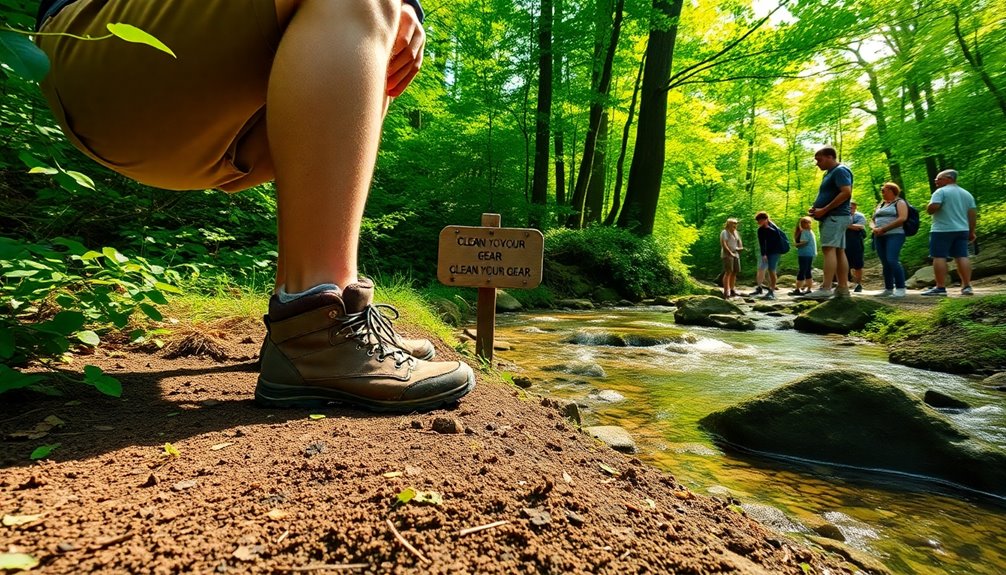You can make a real difference for the planet by ditching five common travel habits. First, cut down on air travel—consider trains instead or use videoconferencing for business. Next, avoid single-use plastics; opt for refillable water bottles and reusable bags. Show respect for local cultures by learning about norms and supporting local artisans. Minimize infrastructure impact by utilizing public transit and bike paths. Finally, help prevent invasive species by cleaning your gear and buying local firewood. These simple changes can significantly reduce your carbon footprint. Keep going to discover other impactful habits you can adopt while traveling!
Key Takeaways
- Replace air travel with train journeys or videoconferencing to significantly reduce your carbon footprint.
- Use reusable containers and bags to eliminate single-use plastics while traveling.
- Learn and respect local customs to enhance cultural understanding and support local traditions.
- Choose public transportation or biking over personal vehicles to minimize infrastructure impact.
- Clean travel gear and buy local products to prevent the spread of invasive species.
Reduce Air Travel

While air travel has long been a staple of modern life, it's time to reconsider its impact on our planet. You can reduce air travel by promoting alternatives.
Consider taking the train instead; it's often more environmentally friendly. For business meetings, use videoconferencing to eliminate unnecessary flights. In fact, a round trip from New York to London emits more CO2 than an average person in Paraguay in a year.
Encourage carpooling and sharing rides, cutting down the number of vehicles on the road. Support sustainable transportation like electric buses and trains, and look for travel routes that minimize air travel reliance.
Avoid Single-Use Plastics

As you embark on your travels, avoiding single-use plastics can significantly reduce your environmental impact. Start by using a reusable water bottle; refill it at water fountains or ask flight attendants to fill it instead of using plastic cups. For toiletries, choose reusable containers and eco-friendly brands with minimal packaging. Pack reusable shopping bags to decline single-use plastic bags when shopping, and select products packaged sustainably. When enjoying food, use reusable containers for take-out and seek restaurants that prioritize minimal packaging. By making these small changes, you'll not only lessen plastic waste but also encourage sustainable practices in the places you visit. It's important to note that the Travel & Tourism sector contributes significantly to plastic pollution, making these efforts even more crucial. Your conscious choices can lead to a cleaner planet for everyone.
Respect Local Culture

Respecting local culture is essential for fostering meaningful connections during your travels. Start by researching cultural norms, including dress codes and greetings. Understanding how locals interact helps you navigate social behaviors and avoid taboos.
Observe locals in public spaces, noting their dress and manners. Engage in conversations to learn about their customs and ask questions to show genuine interest. Participate in local activities to immerse yourself in the culture, and always respect sacred sites. Being aware of social customs can help you avoid offending locals. Additionally, understanding the importance of emotional regulation can enhance your interactions by fostering empathy and respect for different cultural expressions.
Support local traditions by purchasing handmade products and trying traditional cuisine. Be mindful of your impact; ask for permission before taking photos and follow local rules.
These practices not only enrich your experience but also contribute to the preservation of local cultures.
Minimize Infrastructure Impact

To minimize the impact of your travels on local infrastructure, consider choosing efficient transportation modes that not only reduce your carbon footprint but also enhance your journey. Use trains and coaches for shorter distances to enjoy scenic views while lowering emissions. Whenever possible, promote public transit and active transportation, like walking or biking, to reduce reliance on personal vehicles. Indoor water parks, like those found in Indiana's best destinations, provide great family-friendly alternatives for local entertainment rather than traveling far. If air travel is necessary, offset your emissions by supporting carbon reduction projects. Additionally, advocate for sustainable infrastructure design that minimizes waste and energy consumption, as effective transport infrastructure is essential for global connectivity and reducing environmental impact.
Prevent Invasive Species

How can you ensure your travels don't contribute to the spread of invasive species? Start by checking and cleaning your gear.
Before heading out, use boot brush stations to remove weed seeds and thoroughly clean your hiking and fishing equipment. Preventing invasive species is crucial for maintaining local ecosystems and biodiversity.
Opt for rubber waders instead of felt-soled ones, which are harder to clean.
Always buy firewood locally to avoid moving invasive pests and dispose of unused bait responsibly.
Don't forget to wash your vehicles and shake out any camp accessories before leaving.
Educate yourself about local invasive species and report any sightings to authorities.
Frequently Asked Questions
How Can I Offset My Travel Carbon Emissions Effectively?
To offset your travel carbon emissions effectively, start by choosing a reputable carbon offset program.
Look for certified initiatives that invest in diverse projects like reforestation or renewable energy.
Utilize carbon offset calculators to gauge your trip's emissions accurately.
Also, consider airlines that offer offset options at booking, making it easy to contribute.
What Are the Best Eco-Friendly Travel Apps Available?
You might think eco-friendly travel apps are complicated or hard to use, but that's not the case.
Apps like Green Travel Choice let you track your emissions and find sustainable alternatives easily.
Refill connects you with refill stations to cut down on plastic waste, while Ecosia helps you plant trees just by searching online.
With tools like Google Maps for public transit and HappyCow for plant-based dining, making green choices is simple and accessible!
How Do I Find Sustainable Travel Destinations?
To find sustainable travel destinations, start by researching countries that prioritize renewable energy, like Costa Rica or Iceland.
Look for places with significant protected areas, such as Rwanda or Madagascar, to experience nature conservation firsthand.
Check for eco-conscious accommodations that support local communities, like those in New Zealand.
Finally, seek out destinations with active conservation efforts and green tourism certifications to ensure your travels positively impact the environment.
Can I Travel Sustainably on a Budget?
Yes, you can travel sustainably on a budget! Start by packing light to save on fees and energy.
Use reusable items like water bottles and shopping bags to cut down on waste.
Opt for public transportation such as buses or trains, which are often cheaper and greener.
Choose eco-friendly accommodations that support local communities.
Lastly, travel locally and take your time to immerse yourself in the culture while reducing your carbon footprint.
What Certifications Should I Look for in Eco-Friendly Accommodations?
When you're looking for eco-friendly accommodations, check for certifications like Green Seal, which emphasizes waste reduction and energy conservation.
Green Key is another great option, ensuring hotels meet strict environmental standards.
You might also consider Green Globe, which aligns with UN Sustainable Development Goals, and EarthCheck, focusing on continuous improvement in sustainability.
Lastly, Travelife certification indicates a commitment to sustainability in tourism.
These certifications can guide you to greener choices while traveling.
Conclusion
By ditching these common travel habits, you're not just a tourist; you become a steward of the planet. Think of your journey as a ripple in a pond—every small change you make spreads outward, influencing others. When you choose a train over a plane or bring your reusable water bottle, you spark a wave of eco-consciousness. So, let's create a tidal wave of positive change together, ensuring the beauty of our world remains for generations to come.










